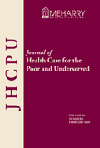
Lisa Maldonado

Ruth Lesnewski

Linda Prine
Lisa Maldonado, co-author of Community Health Centers’ Role in Family Planning [PDF], discusses her ACU Column, published in the May 2013 issue of the Journal of Health Care for the Poor and Underserved. Maldonado serves as Executive Director of the Reproductive Health Access Project while her co-authors Ruth Lesnewski and Linda Prine are both affiliated with the Institute for Family Health and the Reproductive Health Access Project.
Q. What are the lessons that you want other clinicians to take away from this article?
A. Community health centers are the future of primary care in this country. It is critical that they step up to the plate as providers of comprehensive, high quality, patient-centered family planning care.
Q. What inspired you to write the article?
A. The Affordable Care Act is creating exciting opportunities to greatly reduce unintended pregnancy in the United States. Now that contraceptives are fully covered by insurance, cost should no longer be an issue for most people. As community health centers expand in number and capacity, millions more in country will have access to primary care. We need to make sure that this expanded access to primary care translates to expanded access to effective contraception.
Q. Were there any findings in your research that powerfully affected you?
A. We know that helping women be successful in planning their families has a tremendous positive public health impact: women are healthier and lead more fulfilling lives, their children and families are healthier and their communities benefit. This is why family planning plays such a critical role in development worldwide. We also know, from the interviews we’ve conducted with clinicians, that helping women have children when they want and are ready for them is often the most rewarding of all clinical experiences.
 Follow
Follow




Follow Us!